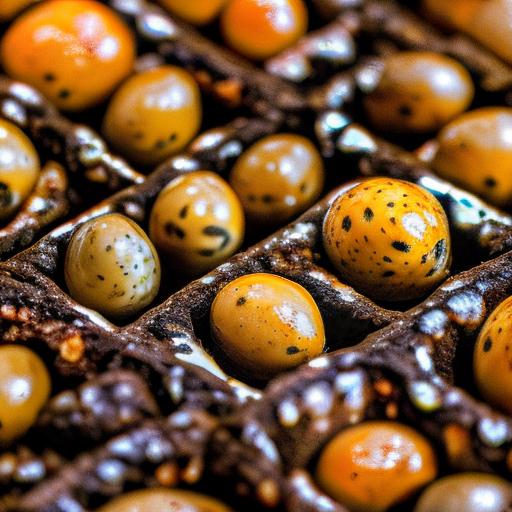Quail eggs are a popular delicacy in many parts of the world, known for their small size and delicate flavor. They are often used in gourmet cooking and are a common ingredient in many Asian and European cuisines. Quail eggs are not only delicious, but they are also packed with nutrients, including vitamins A, B2, and B12, as well as minerals like iron and zinc. They are also a good source of high-quality protein, making them a healthy addition to any diet.
Cooked quail eggs are a versatile ingredient that can be used in a variety of dishes, from salads and appetizers to main courses and even desserts. They can be boiled, fried, or pickled, and are often used as a garnish or topping for other dishes. Because of their small size, quail eggs cook quickly and can be easily incorporated into a wide range of recipes. Whether you are a professional chef or a home cook, quail eggs are a fun and flavorful ingredient to experiment with in the kitchen.
Key Takeaways
- Quail eggs are small, nutritious, and versatile, making them a popular choice for cooking and snacking.
- Cooked quail eggs should be stored in an airtight container in the refrigerator to maintain freshness and prevent spoilage.
- Refrigerated cooked quail eggs can be kept for up to 7 days, but it’s best to consume them within 3-4 days for optimal quality.
- Cooked quail eggs can be frozen for longer storage, but it’s important to use airtight containers or freezer bags to prevent freezer burn.
- The shelf life of cooked quail eggs varies depending on storage methods, but they can generally be kept for up to 2 weeks in the refrigerator and up to 3 months in the freezer.
- Signs of spoilage in cooked quail eggs include a sour or off smell, slimy texture, or discoloration, and they should be discarded if any of these are present.
- When using cooked quail eggs, consider adding them to salads, soups, or as a protein-packed snack, and be mindful of their shelf life to ensure freshness.
Storage of Cooked Quail Eggs
Once quail eggs have been cooked, it is important to store them properly to ensure their safety and quality. Cooked quail eggs should be stored in an airtight container to prevent them from absorbing any odors or flavors from other foods in the refrigerator. It is best to store them in a single layer to prevent them from sticking together or becoming squashed. If you have a large quantity of cooked quail eggs, you can separate them into smaller portions and store them in multiple containers.
Refrigeration of Cooked Quail Eggs
Refrigeration is the best way to store cooked quail eggs to keep them fresh and safe to eat. Cooked quail eggs should be refrigerated at a temperature of 40°F (4°C) or below. They should be consumed within 7 days of cooking for the best quality and safety. It is important to label the container with the date the quail eggs were cooked so that you can keep track of how long they have been in the refrigerator. If you are unsure about the freshness of the cooked quail eggs, it is best to err on the side of caution and discard them.
Freezing Cooked Quail Eggs
If you have a large quantity of cooked quail eggs that you cannot consume within 7 days, freezing is an option for extending their shelf life. To freeze cooked quail eggs, it is best to peel them first and then place them in an airtight container or freezer bag. It is important to remove as much air as possible from the container to prevent freezer burn. Cooked quail eggs can be frozen for up to 3 months without compromising their quality. When you are ready to use the frozen quail eggs, simply thaw them in the refrigerator overnight before using them in your recipes.
Shelf Life of Cooked Quail Eggs
The shelf life of cooked quail eggs depends on how they are stored. When properly refrigerated at 40°F (4°C) or below, cooked quail eggs can last for up to 7 days. If you choose to freeze them, cooked quail eggs can last for up to 3 months without any significant changes in quality. It is important to keep track of the date the quail eggs were cooked and stored to ensure that they are consumed within the recommended time frame. Consuming cooked quail eggs past their shelf life can increase the risk of foodborne illness, so it is important to be mindful of their freshness.
Signs of Spoilage in Cooked Quail Eggs

It is important to be able to recognize the signs of spoilage in cooked quail eggs to ensure that they are safe to eat. If you notice any changes in color, texture, or odor, it is best to discard the cooked quail eggs. Signs of spoilage may include a slimy or discolored appearance, an off-putting odor, or a sour taste. If you are unsure about the safety of the cooked quail eggs, it is best to err on the side of caution and discard them. Consuming spoiled food can lead to foodborne illness, so it is important to prioritize food safety when handling and storing cooked quail eggs.
Tips for Using Cooked Quail Eggs
There are many creative ways to use cooked quail eggs in your recipes. They can be sliced and used as a garnish for salads, soups, or appetizers, adding a pop of color and flavor to your dishes. Cooked quail eggs can also be halved and used as a topping for sushi or added to bento boxes for a fun and tasty addition. They can also be pickled and used as a tangy and flavorful addition to charcuterie boards or antipasto platters. Additionally, cooked quail eggs can be used as a protein-packed snack on their own or added to sandwiches and wraps for an extra boost of nutrition.
In conclusion, cooked quail eggs are a versatile and nutritious ingredient that can be enjoyed in a variety of dishes. By following proper storage guidelines and being mindful of their shelf life, you can ensure that your cooked quail eggs are safe to eat and maintain their quality. Whether you choose to refrigerate or freeze them, it is important to keep track of their freshness and discard any that show signs of spoilage. With these tips in mind, you can confidently incorporate cooked quail eggs into your culinary creations and enjoy their unique flavor and texture.
If you’re wondering how long cooked quail eggs can be kept, you might also be interested in learning about the best practices for keeping chickens and maintaining a healthy coop. Check out this informative article on chicken coop maintenance in Grand Island, NE to ensure that your feathered friends are happy and healthy. Understanding the proper care for your chickens and their living environment can contribute to the overall well-being of your poultry.
FAQs
How long do cooked quail eggs keep?
Cooked quail eggs can be kept in the refrigerator for up to 1 week.
How should cooked quail eggs be stored?
Cooked quail eggs should be stored in an airtight container in the refrigerator to maintain their freshness.
Can cooked quail eggs be frozen?
Yes, cooked quail eggs can be frozen for up to 2 months. It is best to store them in an airtight container or freezer bag to prevent freezer burn.
How can you tell if cooked quail eggs have gone bad?
If cooked quail eggs develop an off smell, slimy texture, or unusual color, they have likely gone bad and should be discarded.
What are some ways to use leftover cooked quail eggs?
Leftover cooked quail eggs can be used in salads, as a topping for ramen or noodle dishes, or as a protein-packed snack.
Meet Walter, the feathered-friend fanatic of Florida! Nestled in the sunshine state, Walter struts through life with his feathered companions, clucking his way to happiness. With a coop that’s fancier than a five-star hotel, he’s the Don Juan of the chicken world. When he’s not teaching his hens to do the cha-cha, you’ll find him in a heated debate with his prized rooster, Sir Clucks-a-Lot. Walter’s poultry passion is no yolk; he’s the sunny-side-up guy you never knew you needed in your flock of friends!







